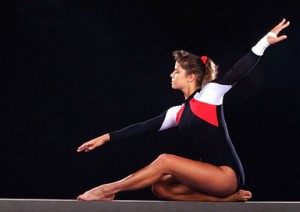 Because I don’t currently have a television, I wasn’t able to catch much of this summer’s Olympic games. But I did see just enough to remind me that once upon a time—in the summer of 1992, to be exact—I harbored my own dreams of Olympic glory.
Because I don’t currently have a television, I wasn’t able to catch much of this summer’s Olympic games. But I did see just enough to remind me that once upon a time—in the summer of 1992, to be exact—I harbored my own dreams of Olympic glory.
I was ten, and a year or so earlier had happened to catch the women’s gymnastics World Championships on television. Immediately I fell in love with everything about the sport and its athletes, the serious young girls who approached their work with exactitude and fearlessness.
Flat-chested and well-muscled, with hair pulled back into strict ponytails or buns, the gymnasts looked at once prepubescent and adult. Their girlish features rarely portrayed any emotion—only fierce concentration.
While the floor routines gave them the opportunity to do something that looked close to having fun, tumbling and dancing along to selected music, the precision of their movements was too exact to portray much joy.
At the end of a routine, no matter how perfectly executed, they walked stoically back to their coaches for a short talk or perfunctory pat on the back before sitting down to wait for their scores as if they were about to be executed. A particularly high score might merit a small, brief smile and a little wave, but that was it.
I’m not sure what it says about ten-year-old me that I thought this was awesome: I fantasized about wearing a red, white, and blue tracksuit and nodding solemnly while my coach, the legendary Bela Karolyi, put his hands on my shoulders and critiqued my near-perfect performance. My curling-ironed bangs would bob a little with each nod. I’d learn what to do better next time.
My favorite gymnast headed into the 1992 Barcelona Olympics was Kim Zmeskal, who’d earned gold in both floor and beam routines in the ’92 World Championships in Paris, and had taken the all-around gold in Nationals in Indianapolis the year before. Hopes were on her to lead the U.S. women’s team to a strong Olympic showing.
The first night of the games, I sat cross-legged just a foot or so in front of our TV. Zmeskal was scheduled to perform her first compulsory routine on the beam, but then, tragedy struck. Only a few seconds into her performance, she fell off the beam. I was stunned. The announcers were stunned. The spectators were stunned. And even though she immediately remounted the beam and finished her routine, it was obvious that Zmeskal was stunned, too.
The balance beam was my favorite apparatus. It was so much my favorite that I constructed my own out of materials I found in our chicken house: two concrete cinder blocks and a thick wooden beam. I set them up on our side lawn and practiced doing handstands and cartwheels on them.
Was the beam actually attached to the blocks? No. Was the wood sanded to prevent splinters in my feet and hands? No. Did I actually believe that if I worked long enough and hard enough I could have a shot at being an Olympic gymnast and succeeding where my predecessor had failed? Yes.
It may surprise you to learn that my dream of being on the Olympic women’s gymnastics team was never realized. Instead, I went on to earn an MFA. in Creative Writing—specifically, in poetry.
A far cry from my original dream, you say? In some ways, yes. But in others, not so much.
Poetry is the balance beam of the genres. The poet works within the confines of a line—literally. She starts at one end and progresses carefully to the other, at which point she pivots and does it again until her exercise is complete
Because of the narrow confines of the apparatus, the poet has little room for error. Just as landing an inch off-point can cause a gymnast to leave the beam completely, one ill-chosen word or wrongly-stressed syllable or instance of overbearing alliteration can derail a poem, making it difficult to recover. One wobble and you’ve dropped several tenths of a point
Compare this to the floor exercise of prose writers. Sure, they have some restrictions. They are given a large square (like a page), and are forbidden to go out-of-bounds. But within that space, they can flip and turn in any direction. A misstep can be hidden in a sea of other movements, other words.
This is not to say their discipline is not as rigorous. Only that it is different. And of course these metaphors break down fairly quickly.
Like the dedicated gymnasts I idealized when I was ten, what writers of all stripes take joy in is their work, the actual labor of it, which is in both the mind and the body. True perfection is unobtainable, and a job well done on one exercise only means that expectations are higher on the next.
You are alone in writing, and you have an audience. Your coach—a teacher, a mentor, or yourself—is evaluating you, and is hard to impress. You improve only through practice, but even constant practice doesn’t guarantee success. When it comes down to it, there are times when you fall off the beam, or don’t keep your legs straight, or stumble out-of-bounds
But when you stick your landing and put up your hands, and can give that tiny smile and wave, it’s all worth it.












